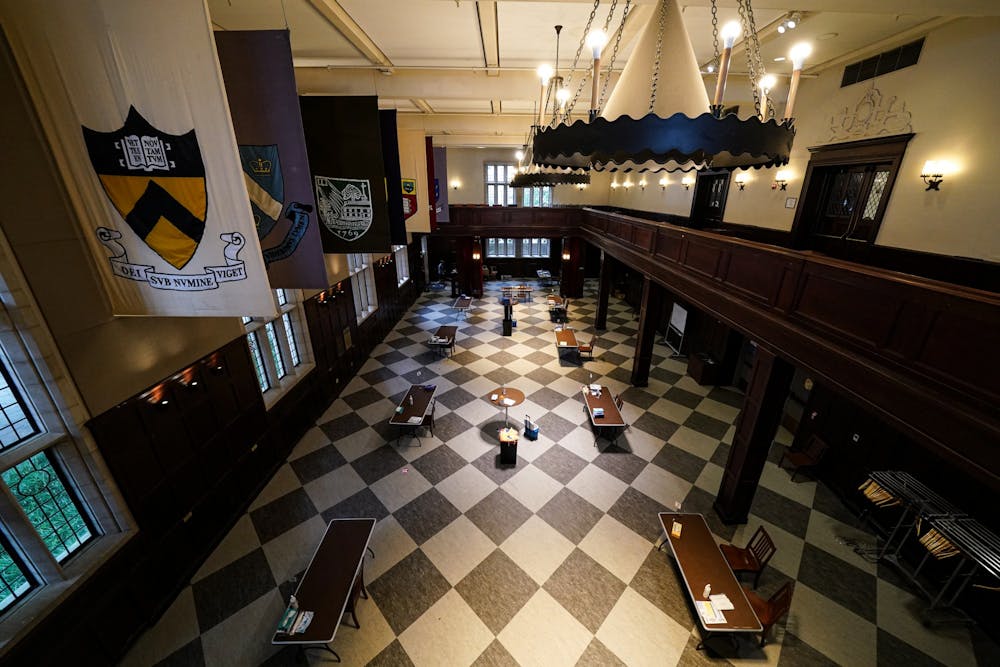As COVID-19 cases in Greek Life at Penn and at colleges across the country continue to increase, the University will release new guidelines on COVID-19 prevention and testing on Friday.
In an interview with The Daily Pennsylvanian on Thursday evening, Penn's Chief Wellness Officer Benoit Dubé and Director of Campus Health Ashlee Halbritter said Penn will send two emails on Friday, one of which will be sent to all members of the Penn community and announce that Penn will continue testing students for COVID-19 through the rest of the semester, and another detailing specific virus mitigation strategies for students in Greek Life and communal housing.
Dubé said the University will take a "data-driven approach" to testing asymptomatic individuals — essentially testing students based on various factors like location – throughout the rest of the semester, and that more information will be provided in Friday's email. The announcement comes after hundreds of students petitioned the University to continue to provide widespread testing for all students for the entire semester.

A station set up in Houston Hall of Flags with PPE for COVID-19 testing.
The email comes as gateway testing — the testing of asymptomatic students arriving in Philadelphia — is set to end on Sept. 12. Since Penn began gateway testing on Aug. 8, 68 students have tested positive for COVID-19, less than .68% of the total 10,065 tested.
The second email, which will be sent to students in Greek Life, off-campus Greek affiliated organizations, athletics, and student organizations known to live in common houses, has been written in conjunction with the Philadelphia Department of Public Health to help these groups lessen and contain and reduce the virus's spread.
A memo written by Philadelphia Health Commissioner Thomas Farley will be apart of the email. The memo, titled "Alert — COVID-19 Transmission among Greek Organization Members and Affiliates," was written in response to a large number of positive cases in Greek Life organizations at Penn, Temple University, and other Philadelphia-area colleges, Director of Digital Public Health Jim Garrow said in the interview with the DP.
Halbritter declined to specify the exact group or college, but said in one Philadelphia Greek house, 39% of residents tested positive for the virus.
RELATED:
Hundreds petition Penn to extend widespread COVID-19 testing for the entire fall semester
At least 42 Penn students tested positive for COVID-19 on campus in the past two weeks
"This memo is meant to be a targeted communication to students in Greek Life, but it applies to other students as well," Garrow said. "We are recommending that students living in large households remain in their homes."
Some organizations, however, have been successful in their COVID-19 mitigation efforts, Dubé said. Halbritter pointed to the Alpha Phi sorority, who owns its chapter house located off campus, as a Greek organization who has successfully created a mitigation plan that includes barring non-residents from entering the house.
Halbritter urged other students living with more than two roommates to create a specific set of house plans and rules relating to COVID-19.

Socially distant markers have been placed outside of Houston Hall to ensure people follow CDC health guidelines.
Under the new PDPH guidelines, which will be outlined in the email, students will be asked to prohibit social gatherings among members that involve others outside of their household and for members who test positive to remain in their own rooms.
Associate Vice Provost for Student Affairs Tamara Greenfield King and Senior Associate Athletic Director for Intercollegiate Programs Rudy Fuller said these specific student populations were selected to receive the email because they are known to live together, not because they are the only students not following COVID-19 prevention guidelines.
"We have been sending our athletes lots of information and they are doing their best, but it is a lot to keep up with," Fuller said. "This email will highlight a specific set of the most updated instructions."
In the past weeks, students have reported seeing parties around campus and been sharing their concerns about further community spread on social media.
Dubé said the Compact Review Panel — a team of public health experts who are tasked with investigating those who stray from the expectations outlined in the Student Campus Compact — received 34 complaints regarding student behavior in the month of August, 17 of which were related to large gatherings. The rest were related to individuals or small groups, usually for not wearing masks.
"We want to recognize, first off, that we are doing quite well with our positivity rate but what we are saying is that of the cases, most of them were avoidable by students making more responsible choices," Dubé said.
Halbritter emphasized that students must continue to do the little things to prevent further spread of COVID-19, including washing their hands regularly and keeping their masks on at all time spent outside of their home.
"We would not be sending these emails if everything was going perfectly," Halbritter said. "Things are going well but further cases can be avoided if even more students follow these guidelines."









